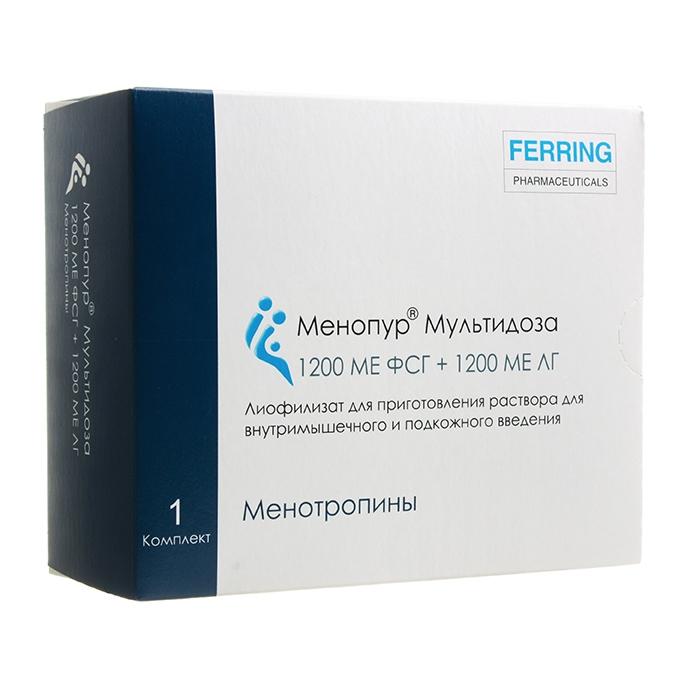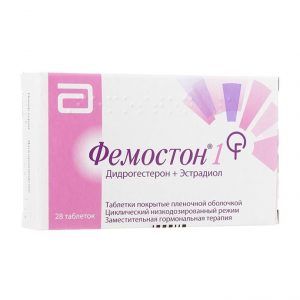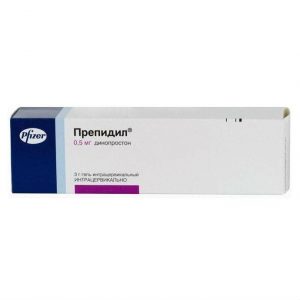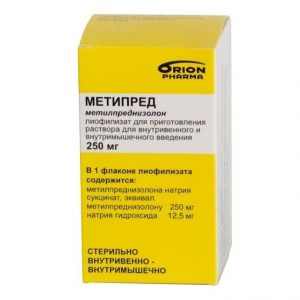Description
Pharmacological action
Pharmacotherapeutic group: follicle-stimulating agent.
ATX code: G03GA02
Pharmacological properties of
Pharmacodynamics
Menopur ® Multidose is a highly purified human menopausal gonadotropin (hMG). The drug belongs to the group of menotropins, contains follicle-stimulating (FSH) and luteinizing (LH) hormones in a ratio of 1: 1. The drug is obtained by extracting FSH and LH from the urine of women in the postmenopausal period. In women, the drug Menopur ® Multidose stimulates the growth and maturation of ovarian follicles, increases the concentration of estrogens, and stimulates the proliferation of the endometrium. In men, it stimulates spermatogenesis with azoospermia or oligoasthenospermia.
Pharmacokinetics
Absorption
The maximum concentration of FSH in blood plasma is reached 7 hours after subcutaneous or intramuscular administration of the drug.
Distribution
The distribution volume after repeated doses of 150 IU for 7 days is 8.9 ± 3.5 IU / L for subcutaneous administration and 8.5 ± 3.2 IU / L for intramuscular administration.
Excretion
It is excreted mainly by the kidneys. The half-life of repeated doses is 30 ± 11 hours for subcutaneous administration and 27 ± 9 hours for intramuscular administration.
Pharmacokinetics in patients with renal and hepatic insufficiency has not been studied.
Contraindications
Hypersensitivity to menotropins and other components of the pituitary or hypothalamic tumor, decompensated hypothyroidism, adrenal cortex insufficiency, hyperprolactinemia, children under 18 years of age.
In women:
persistent ovarian enlargement, ovarian cysts (not caused by polycystic ovary syndrome)
abnormalities in the development of genital organs incompatible with pregnancy
uterine fibroids incompatible with pregnancy
vaginal bleeding of unknown etiology
estrogen-dependent tumors (breast cancer or ovarian cancer a high concentration of FSH in primary ovarian failure
pregnancy and the period of breastfeeding.
In men:
androgen-dependent tumors (prostate cancer, testicular tumor).
If you have one of these diseases, be sure to consult your doctor before taking the drug.
With caution in the presence of risk factors for thromboembolism, such as an individual or family predisposition, obesity (body mass index> 30 kg / m2) or thrombophilia.
Use during pregnancy and lactation
The drug Menopur ® Multidose is contraindicated during pregnancy and breastfeeding.
Special instructions
Treatment should be carried out under the supervision of a doctor who has experience in the treatment of infertility.
The first injection of the drug should be performed under the direct supervision of a physician.
Before prescribing Menopur ® Multidose, the condition of the ovaries should be assessed by ultrasound or by the concentration of estradiol in the blood. During the entire course of treatment, these studies should be carried out daily or every other day. Careful monitoring of the patient’s condition is an integral part of the treatment.
Before starting the use of Menopur ® Multidose, an examination is recommended to detect hypothyroidism, insufficiency of the adrenal cortex, hyperprolactinemia, pituitary or hypothalamic tumors, as well as appropriate specific treatment.
OHSS
OHSS is a syndrome other than uncomplicated ovarian enlargement, the manifestations of which depend on the severity. It includes a significant increase in the ovaries, a high concentration of estrogen in the blood serum, as well as an increase in vascular permeability, which can lead to the accumulation of fluid in the abdominal, pleural and, less commonly, pericardial cavities. In severe cases of OHSS, the following symptoms are observed: abdominal pain, bloating, significant ovarian enlargement, weight gain, shortness of breath, oliguria, and gastrointestinal symptoms, including nausea, vomiting, and diarrhea. With a clinical examination, hypovolemia, hemoconcentration, electrolyte disturbances, ascites, hemoperitoneum are possible, exudative pleurisy, hydrothorax, acute respiratory distress and thromboembolic complications.
An excessive ovarian reaction to the administration of gonadotropins rarely leads to the development of OHSS unless hCG is administered to stimulate ovulation. Therefore, in the case of ovarian hyperstimulation, hCG should not be introduced, and the patient should be warned to refrain from sexual intercourse or to use barrier methods of contraception for at least 4 days. OHSS can progress rapidly (within 24 hours to several days), becoming a serious medical complication, so patients should be observed for at least 2 weeks after hCG administration. Compliance with the recommended doses of Menopur ® Multidose, the mode of administration and careful monitoring of therapy can minimize cases of ovarian hyperstimulation and multiple pregnancy. When performing ART, aspiration of the contents of all follicles before ovulation can reduce the risk of developing OHSS.
OHSS can be more severe and protracted during pregnancy. Most often, OHSS develops after cessation of treatment with gonadotropins and reaches its maximum severity within 7-10 days after treatment. Usually, OHSS occurs spontaneously after the onset of menstruation.
If severe OHSS develops, the patient is hospitalized and specific therapy is started.
OHSS occurs with high frequency in patients with polycystic ovary syndrome.
Multiple Pregnancy
Multiple pregnancies show an increased risk of adverse maternal and perinatal outcomes. With the use of menotropins, a multiple pregnancy develops more often than with a natural conception. In the case of in vitro fertilization (IVF), the probability of multiple pregnancy depends on the number of embryos introduced, their quality and age of the patient. The patient should be warned of the potential risk of multiple pregnancy before starting treatment.
Pregnancy Complications
The frequency of spontaneous abortions during pregnancy following treatment with Menopur ® Multidose is higher than in healthy women.
Ectopic pregnancy
With a history of fallopian tube diseases, both during natural conception and in the treatment of infertility, women have a high risk of ectopic pregnancy. The prevalence of ectopic pregnancy after IVF is from 2 to 5% compared with 1 to 1.5% in the general population.
Neoplasms of the organs of the reproductive system
There are reports of neoplasms of the ovaries and other organs of the reproductive system, both benign and malignant, in women who have undergone several regimens of the drug for the treatment of infertility. It has not yet been established whether treatment with gonadotropins increases the initial risk of these tumors in women with infertility.
Congenital malformations
The prevalence of congenital malformations of the fetus when using ART is slightly higher than during natural conception. It is believed that this may be due to the individual characteristics of the parents (mother’s age, sperm characteristics) and multiple pregnancy.
Thromboembolic complications
Women with known risk factors for thromboembolic complications, such as an individual or family predisposition, obesity (body mass index> 30 kg / m2) or thrombophilia may have an increased risk of venous or arterial thromboembolic complications during or after treatment with gonadotropins. In such cases, the benefits of their use should exceed the risk. It should be borne in mind that pregnancy itself also increases the risk of thromboembolic complications.
In men with a high concentration of FSH in the blood (which indicates primary hypogonadism), Menopur ® Multidose is usually ineffective.
Influence on the ability to drive vehicles and mechanisms
Studies of the effects of menotropins on the ability to drive vehicles and mechanisms have not been conducted. Menopur ® Multidose does not affect the ability to drive vehicles and mechanisms.
Composition of
1 bottle with lyophilisate contains:
active substance: menotropins – 600 IU FSH + 600 IU or 600 IU 1200 IU LH
excipients: lactose monohydrate 21.0 mg, polysorbate-20 0.005 mg, disodium hydrogen phosphate heptahydrate 0.268 mg, phosphoric acid solution 1 M qs, disodium hydrogen phosphate solution 0.5 M qs
1 syringe with solvent contains: metacresol 3 , 63 mg, water for injection up to 1.1 ml.
Dosage and administration
The drug is used as monotherapy or in combination with other means of stimulating ovulation.
The drug Menopur ® Multidose is administered intramuscularly or subcutaneously with a periodic change in the injection site. A subcutaneous route of administration is preferable since it provides the greatest absorption of the drug substance. The doses of the drug described below are given in FSH and are the same for both the subcutaneous and intramuscular route of administration.
In women, the dose of the drug is set individually depending on the reaction of the ovaries. This requires monitoring the response of the ovaries to the therapy in the form of ultrasound (ultrasound) separately, and preferably, in combination with a dynamic measurement of estradiol concentration.
Anovulation (including polycystic ovary syndrome (PCOS) with clomiphene therapy failure)
Treatment with Menopur ® Multidose begins in the first 7 days of the menstrual cycle. The recommended initial dose of 75-150 IU / day for at least 7 days. In the absence of an
ovarian reaction, the dose gradually increases (not more than 1 time every 7 days) until a rise in blood estrogen concentration or follicular growth is recorded. The recommended increasing dose is 37.5 IU, but not more than 75 IU. The maximum daily dose should not exceed 225 IU. If the therapeutic effect is not achieved within 4 weeks of treatment, injections of the drug Menopur ® Multidose stop, and then begin a new cycle with a higher dose of the drug. The patient is recommended to use barrier methods of contraception or abstinence from sexual intercourse until the onset of menstruation.
If there is a therapeutic effect on the day after the last injection of Menopur Multidose, 5.000-10.000 IU of hCG is administered once to induce ovulation. The patient is recommended to have sex on the day of hCG administration and the day after administration. As an alternative method, intrauterine insemination is possible.
In case of an overreaction, the administration of the drug Menopur ® Multidose should be stopped, the administration of hCG should be refused, and the patient is recommended to use barrier methods of contraception or to abstain from sexual intercourse before menstruation.
Controlled ovarian hyperstimulation to induce the growth of multiple follicles in assisted reproductive technology (BPT).
For ART, in combination with GnRH agonists, the use of Menopur ® Multidose should be started approximately 2 weeks after the start of GnRH agonist therapy. The recommended initial dose of Menopur ® Multidose is 150-225 IU / day daily for at least 5 days. In the absence of an ovarian reaction, the dose may gradually increase. The recommended increasing dose is 150 IU. The maximum daily dose should not exceed 450 IU. If the therapeutic effect is not achieved within 20 days, further administration of the drug Menopur ® Multidose is not recommended.
If the treatment regimen does not require prior use of GnRH agonists, the use of the drug Menopur ® Multidose should begin on the 2-3rd day of the menstrual cycle. The dosage regimen is the same.
After reaching the required number of mature follicles, 10,000 IU of hCG is injected once to induce the final maturation of the follicle and prepare the release of a full egg. The patient should be under close medical supervision for 2 weeks after hCG injection in connection with the possible development of ovarian hyperstimulation syndrome (OHS).
In case of an overreaction, the administration of the drug Menopur ® Multidose should be stopped, the administration of hCG should be refused, and the patient is recommended to use barrier methods of contraception or to abstain from sexual intercourse before menstruation.
In case of hypogonadotropic hypogonadism in men for the stimulation of spermatogenesis, Menopur ® Multidose is prescribed if the previous therapy with hCG drugs caused only an androgenic reaction without signs of increased spermatogenesis. In this case, treatment continues by administering 2,000 IU hCG 2 times a week, along with injections of Menopur ® Multidose, 75 IU 3 times a week. Treatment according to this scheme should be continued for a minimum of 4 months, if treatment is ineffective, treatment is continued by administering a hCG preparation of 2000 IU 2 times a week and Menopur ® Multidose 150 IU 3 times a week.
The state of spermatogenesis should be evaluated monthly, and in the absence of positive results, treatment should be discontinued over the next 3 months.
With idiopathic normogonadotropic oligospermia, 5000 IU of hCG and 75-150 IU of Menopur ® Multidose are administered weekly for 3 months.
To stimulate spermatogenesis, 1000 to 3000 IU of hCG is administered 3 times a week until the concentration of testosterone in the blood normalizes. After that, 75-150 IU of Menopur ® Multidose is administered 3 times a week for several months.
Solution Instructions:
Injection is prepared using the supplied solvent. Mixing the drug Menopur ® Multidose with other drugs in one syringe is not allowed! Ready solution can be applied within 28 days.
1. Remove the plastic cap from the lyophilisate vial. Attach a needle for preparation of solution to a syringe with a solvent and remove a protective cap.
2. Inject the solvent slowly into the vial.
BOTTLE HOLD VERTICALLY!
3. Gently mix the contents of the vial in a circular motion until a clear solution is obtained. Dissolution usually occurs in 1-2 minutes. Do not shake! Do not use the solution in case of undissolved particles or discoloration!
4. Pour the required amount of solution into the syringe for injection.
5. Wipe the injection site with an alcohol wipe, remove air bubbles from the syringe and inject the drug.
Side effects
The most serious and frequent adverse reactions identified with Menopur® in clinical trials with a frequency of up to 10% were OHSS, abdominal pain, headache, reactions at the injection site and pain at the injection site. The main adverse reactions identified in clinical trials are shown in the table below.
Organs and systems
Often (> 1/100 and <1/10) Rarely (> 1/1000 and <1/100) Gastrointestinal tract abdominal pain, nausea, flatulence General disorders and disorders at the injection site pain , redness, swelling, or itching at the injection site, arthralgia is very rare: with prolonged use of the drug, antibody formation is possible From the nervous system headache From the endocrine system increased estrogen excretion in the urine, increased body weight Disorders from the genitals and breast , OHSS, in men – gynecomastia Vascular side lowering blood pressure deep vein thrombosis When using the drug Menopur® in clinical trials x observed associated with the development of ovarian hyperstimulation syndrome disorders of the gastrointestinal side, such as bloating, abdominal discomfort, nausea, vomiting and diarrhea. Thromboembolic complications and ovarian torsion were noted as rare complications of OHSS. Very rarely, allergic local or generalized reactions were noted, up to anaphylactic reactions. If any of the side effects indicated in the instructions are aggravated, or if you notice any other side effects not listed in the instructions, inform your doctor. Drug Interactions The drug should not be mixed in the same syringe with other drugs! In order to induce ovulation, Menopur ® Multidose can be prescribed in combination with hCG preparations. The simultaneous use of Menopur ® Multidose with clomiphene may lead to increased follicular growth. Menopur ® Multidose can be used in conjunction with GnRH agonists or antagonists to prevent premature ovulation peak. In this case, an increase in the dose of Menopur ® Multidose may be required. Overdose Cases of overdose are unknown, however, in such situations the development of OHSS is expected, which becomes clinically pronounced after administration of hCG preparations and is manifested by the formation of large ovarian cysts. At the first signs of hyperstimulation – abdominal pain, palpable by the doctor or determined by ultrasound volumetric formations in the lower abdomen, nausea, vomiting, blood concentration, electrolyte imbalance, – Gonadotropin treatment should be stopped immediately! Gynecological examination is carried out very carefully to avoid rupture of ovarian cysts, for the same purpose it is recommended to avoid sexual contact. OHSS is regarded as moderately expressed in those cases when there are: flatulence, nausea, vomiting, occasionally diarrhea and an increase in ovarian size up to 5-10 cm (3-6 days after hCG administration). Treatment in these cases consists in observing bed rest and constant monitoring. The above symptoms in this case regress spontaneously after 2-3 weeks. OHSS is regarded as expressed in those cases when it is observed: severe bloating, the appearance of ascites, hydrothorax or hydropericardium, an increase in ovarian size more than 12 cm, a decrease in the volume of circulating blood, and the development of cardiovascular shock. Treatment in these cases consists of hospitalization, measures aimed at restoring the volume of circulating blood, correcting electrolyte disturbances and preventing the development of shock. Correction of water-electrolyte disturbances should be carried out with caution. It is necessary to maintain an acceptable, but slightly reduced in comparison with the normal volume of circulating blood to prevent the transition of hemoconcentration to the acute phase. Diuretics are used only in the reverse phase of this syndrome to eliminate hypervolemia resulting from the absorption of fluid from the cavities into the bloodstream. Do not remove fluid from the abdominal, pleural, or pericardial cavities unless there are absolute indications. Storage conditions At a temperature of 2-8 ° C. Do not freeze. Store the prepared solution for no more than 28 days at a temperature not exceeding 25 ° C. Keep out of the reach of children. The Expiration of is 3 years. Deystvuyuschee substances Menotropyn Terms of delivery from pharmacies Prescription




